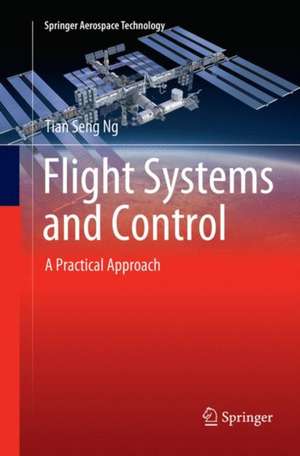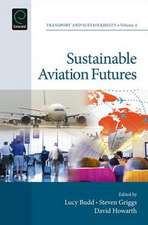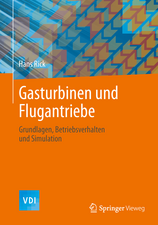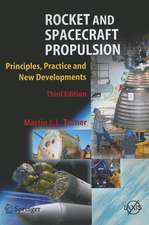Flight Systems and Control: A Practical Approach: Springer Aerospace Technology
Autor Tian Seng Ngen Limba Engleză Paperback – 16 dec 2018
| Toate formatele și edițiile | Preț | Express |
|---|---|---|
| Paperback (1) | 621.58 lei 38-44 zile | |
| Springer Nature Singapore – 16 dec 2018 | 621.58 lei 38-44 zile | |
| Hardback (1) | 1112.60 lei 6-8 săpt. | |
| Springer Nature Singapore – 23 mai 2018 | 1112.60 lei 6-8 săpt. |
Din seria Springer Aerospace Technology
- 18%
 Preț: 782.42 lei
Preț: 782.42 lei - 18%
 Preț: 891.33 lei
Preț: 891.33 lei - 18%
 Preț: 897.65 lei
Preț: 897.65 lei - 18%
 Preț: 944.19 lei
Preț: 944.19 lei - 18%
 Preț: 1112.30 lei
Preț: 1112.30 lei - 18%
 Preț: 779.26 lei
Preț: 779.26 lei - 20%
 Preț: 565.19 lei
Preț: 565.19 lei - 18%
 Preț: 987.11 lei
Preț: 987.11 lei -
 Preț: 366.33 lei
Preț: 366.33 lei - 18%
 Preț: 949.73 lei
Preț: 949.73 lei - 20%
 Preț: 629.52 lei
Preț: 629.52 lei - 24%
 Preț: 855.09 lei
Preț: 855.09 lei - 15%
 Preț: 583.78 lei
Preț: 583.78 lei - 15%
 Preț: 579.84 lei
Preț: 579.84 lei - 18%
 Preț: 1112.60 lei
Preț: 1112.60 lei - 18%
 Preț: 947.35 lei
Preț: 947.35 lei - 23%
 Preț: 1611.35 lei
Preț: 1611.35 lei -
 Preț: 455.78 lei
Preț: 455.78 lei - 15%
 Preț: 581.98 lei
Preț: 581.98 lei - 18%
 Preț: 1112.15 lei
Preț: 1112.15 lei - 15%
 Preț: 578.87 lei
Preț: 578.87 lei - 18%
 Preț: 995.83 lei
Preț: 995.83 lei - 15%
 Preț: 635.01 lei
Preț: 635.01 lei - 18%
 Preț: 1406.03 lei
Preț: 1406.03 lei - 24%
 Preț: 1798.72 lei
Preț: 1798.72 lei - 15%
 Preț: 580.68 lei
Preț: 580.68 lei - 15%
 Preț: 701.25 lei
Preț: 701.25 lei - 18%
 Preț: 896.21 lei
Preț: 896.21 lei - 15%
 Preț: 646.30 lei
Preț: 646.30 lei - 18%
 Preț: 943.88 lei
Preț: 943.88 lei - 15%
 Preț: 576.42 lei
Preț: 576.42 lei - 24%
 Preț: 1160.87 lei
Preț: 1160.87 lei - 15%
 Preț: 703.20 lei
Preț: 703.20 lei - 18%
 Preț: 947.35 lei
Preț: 947.35 lei - 18%
 Preț: 784.79 lei
Preț: 784.79 lei
Preț: 621.58 lei
Preț vechi: 807.25 lei
-23% Nou
Puncte Express: 932
Preț estimativ în valută:
118.95€ • 129.17$ • 99.92£
118.95€ • 129.17$ • 99.92£
Carte tipărită la comandă
Livrare economică 19-25 aprilie
Preluare comenzi: 021 569.72.76
Specificații
ISBN-13: 9789811342233
ISBN-10: 9811342237
Pagini: 241
Ilustrații: XXIII, 241 p. 206 illus., 163 illus. in color.
Dimensiuni: 155 x 235 mm
Ediția:Softcover reprint of the original 1st ed. 2018
Editura: Springer Nature Singapore
Colecția Springer
Seria Springer Aerospace Technology
Locul publicării:Singapore, Singapore
ISBN-10: 9811342237
Pagini: 241
Ilustrații: XXIII, 241 p. 206 illus., 163 illus. in color.
Dimensiuni: 155 x 235 mm
Ediția:Softcover reprint of the original 1st ed. 2018
Editura: Springer Nature Singapore
Colecția Springer
Seria Springer Aerospace Technology
Locul publicării:Singapore, Singapore
Cuprins
Introduction.- Flight Mechanics.- Navigational Modules.- Flight Simulator Systems.- Tandem Rotor Helicopter Control.- Unmanned Aerial Vehicle System.- Rotorcrafts.- Flight Instrumentation Acquisition.- Recent And Future Developments.
Recenzii
“This book should be of interest to practicing and research engineers as well as Ph.D. students in the area of flight mechanics, flight computer control and its accessories for flight engineering practices and applications.” (Clementina Mladenova, zbMATH 1435.93001, 2020)
Notă biografică
Mr. Tian Seng Ng has a MSc degree in Computer Control and Automation. He is a member of the technical staff at the Nanyang Technological University. He has been active in the field of flight robotics, control, and automation for almost 25 years, and has worked on gantry crane automation systems at wharves and field pumping stations in Singapore. His interest lies in the domain of control, mechatronics, autonomous systems and machine vision.
Textul de pe ultima copertă
This book focuses on flight vehicles and their navigational systems, discussing different forms of flight structures and their control systems, from fixed wings to rotary crafts. Software simulation enables testing of the hardware without actual implementation, and the flight simulators, mechanics, glider development and navigation systems presented here are suitable for lab-based experimentation studies. It explores laboratory testing of flight navigational sensors, such as the magnetic, acceleration and Global Positioning System (GPS) units, and illustrates the six-axis inertial measurement unit (IMU) instrumentation as well as its data acquisition methodology. The book offers an introduction to the various unmanned aerial vehicle (UAV) systems and their accessories, including the linear quadratic regulator (LQR) method for controlling the rotorcraft. It also describes a Matrix Laboratory (MATLAB) control algorithm that simulates and runs the lab-based 3 degrees of freedom (DOF) helicopter, as well as LabVIEW software used to validate controller design and data acquisition. Lastly, the book explores future developments in aviation techniques.
Caracteristici
Highlights flight structures and their control systems Includes Matrix Laboratory (MATLAB) codes/plots and the Virtual Reality Modeling Language (VRML) program as examples Provides an introduction to various unmanned aerial vehicle (UAV) systems and their accessories















